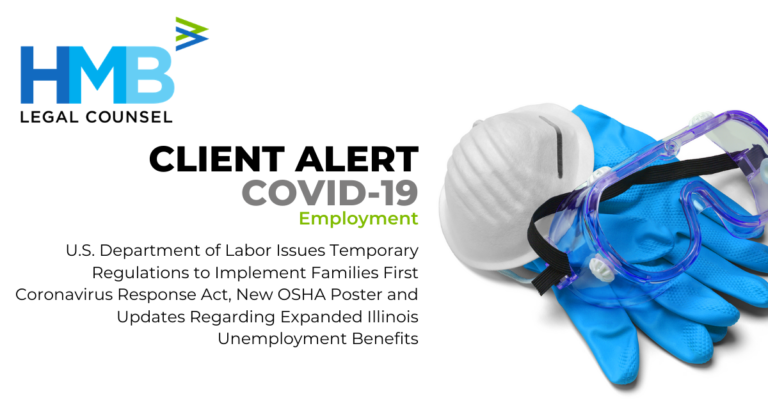Families First Coronavirus Response Act
On April 1, 2020, the U.S. Department of Labor (“DOL”) issued temporary regulations (the “Rule”) to implement the Families First Coronavirus Response Act (“FFCRA”), providing additional guidance to employers and employees on how to provide and take expanded family and medical leave or paid sick leave (collectively, “Leave”) under the FFCRA. A copy of the temporary rule can be found here. Although much of the Rule is consistent with previous guidance, the Rule does provide additional clarifying information on certain key points. How the FFCRA, DOL guidance and the Rule may impact any particular employer or employee remains fact specific, however, and you should reach out to your HMB contact for assistance as questions arise.
Read MoreWho are the Health Care Providers and Emergency Responders Potentially not Covered by the FFCRA? As previously noted, employers may exclude health care providers and emergency responders from taking Leave. But who are health care providers and emergency responders under the Rule? It’s broader than you might think. In addition to including doctors, nurses, law enforcement, the military, national guard, emergency medical technicians, health care workers and emergency response personnel, it also includes anyone else who is directly employed by a health care facility, medical school, laboratory and testing facility, retirement facility, nursing home and similar facility or institution, or who works for an employer that contracts with any of these types of facilities or institutions to provide services or to maintain the operation of such facilities or institutions. The complete list may vary by state (including territories and the District of Columbia) as states have been given the authority to add to this list to the extent such state determines that the provider is necessary for the state’s response to COVID-19.
Taking Paid Sick Leave to Seek a Medical Diagnosis? Employees are only eligible to take Leave for this reason if the employee is experiencing COVID-19 related symptoms and the employee is taking affirmative steps to obtain a medical diagnosis (e.g., going to a doctor’s appointment).
Terminated and then Rehired? Employees who were terminated, but then rehired before December 31, 2020, are eligible for Leave if the employee was on the employer’s payroll for at least 30 calendar days out of the 60 calendar days prior to the date the employee was terminated.
Working Furlough with Reduced Rate of Pay? Such employees are eligible to receive Leave based on their pre-furlough regular rate of pay.
Recordkeeping Obligations Explained. To assist with recordkeeping obligations under the FFCRA, upon a request for Leave, we recommend that employers provide employees with a questionnaire that tracks the requirements of the Rule. Such questionnaire should include, at a minimum, the following information: (1) employee name, (2) dates for which Leave is requested, (3) qualifying reason for Leave, (4) oral or written statement that the employee is unable to work because of the qualifying reason, and (5) such other documentation as required by the Rule depending on the qualifying reason. Employers are required to retain all documentation collected under the FFCRA for four years, even if Leave is denied. Any oral statements to support an employee’s request for Leave must also be documented and maintained. Additionally, to claim a tax credit, employers are required to keep: (1) documentation that demonstrates how the employer determined the amount of Leave paid to employees that are eligible for the tax credit, (2) documentation that demonstrates how the employer determined the amount of qualified health expenses that the employer allocated to wages, (3) copies of completed IRS Forms 7200 (Advance of Employer Credits Due to COVID-19) and Forms 941 (Employer’s Quarterly Federal Tax Return), and (4) other documents as may be required by the Internal Revenue Service.
Guidance from the Internal Revenue Service (“IRS”). The IRS has also released guidance for employers about how to pay for Leave and how to apply for tax credits under the FFCRA. Employers will use Form 941 to report qualified leave wages and Form 7200 to request an advance payment of tax credits for qualified leave wages.
New OSHA Poster
On April 6, 2020, the DOL published a new OSHA poster aimed at reducing workplace exposure to COVID-19. The poster highlights 10 infection prevention measures every employer can implement to protect workers’ safety and health during the pandemic. Safety measures include encouraging sick workers to stay home; establishing flexible worksites and staggered work shifts; discouraging workers from using other workers’ phones, desks and other work equipment; and using Environmental Protection Agency-approved cleaning chemicals with label claims against COVID-19. The poster can be found here.
Expanded Illinois Unemployment Benefits.
Yesterday, the Illinois Department of Employment Security released an update regarding the timing and payment of the CARES Act Unemployment Expansion Coverage. The update can be found here.
Additional Funds. Federal Pandemic Unemployment Compensation (“FPUC”) provides an additional $600 per week for individuals receiving regular unemployment benefits, PUA, PEUC, or extended benefits if they are triggered under Illinois law. On April 5, 2020, the DOL noted that any individual who receives unemployment benefits, even if the benefits are only $1 per week, would be eligible for the additional $600 per week. However, it is unclear whether IDES has yet to include this guidance in its benefits. Generally, FPUC has been implemented and IDES began disbursement of payment to those individuals receiving unemployment benefits beginning the week of April 6, 2020. The additional $600 payment will conclude the week of July 25, 2020.
13-Week Extension of Unemployment. Pandemic Emergency Unemployment Compensation (“PEUC”) provides an additional 13 additional weeks of federally funded unemployment benefits for individuals who have exhausted their regular unemployment benefits.
Independent Contractors. Pandemic Unemployment Assistance (“PUA”) provides a total of 39 weeks of federally funded unemployment benefits to individuals not typically eligible for unemployment benefits, including independent contractors and self-proprietors, but who have become unemployed as a direct result of COVID-19. Note that this portion of the CARES Act has not yet been implemented in Illinois. Further details about the program, how to apply, and eligibility requirements will be made as soon as the details have been finalized at IDES.Illinois.gov.
HMB Legal Counsel will continue to provide updates as the situation evolves. The ongoing issues related to the spread of the Coronavirus (COVID-19) have had and will continue to have a significant impact on individuals, families, businesses and markets. Visit our collection of resources providing guidance during these fast-changing circumstances. Please reach out to your lead team member to answer specific questions.



